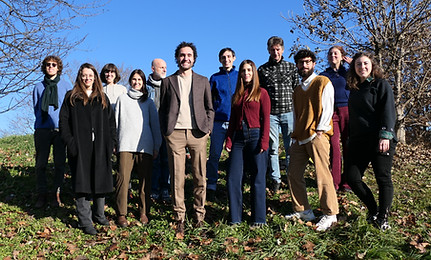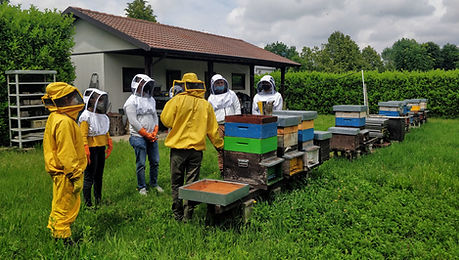The Bee Health and Behaviour Lab (BeeLab) is based at the University of Turin (UNITO), Department of Agricultural, Forest, and Food Sciences (DISAFA). Founded in 1404, UNITO is one of Italy’s oldest public universities and serves approximately 70,000 students, with a strong focus on research and higher education
Coordinated by Prof. Simone Tosi, the BeeLab includes a dynamic team of scientists, including Dr. Davide Cuttini (research technician), postdocs, PhDs, research collaborators, and undergraduates.
The BeeLab is dedicated to investigating the health and behaviour of wild and managed, social and solitary pollinators, including honey bees, bumble bees, Osmia, Halictus, Lasioglossum, and Anthidium. Our research aims to advance a comprehensive understanding of the cognition, behaviour, and health of pollinators. We investigate the impact of complex stress interactions affecting pollinators, focusing on the individual and combined effects of multiple stressors — such as pesticides, nutrition, climate, pathogens, and generally environmental change. We use traditional and innovative multidisciplinary techniques that integrate behavioural, physiological, and modelling approaches for research, (bio)monitoring, and risk assessment.
Our work contributes to both fundamental knowledge and applied solutions for pollinator conservation and the improvement of sustainable ecosystem services. Findings from our research inform science-based policy, environmental risk assessment frameworks, and practical management strategies.

The BeeLab team, in Autumn

Students with the bee technician
We believe that a respectful, open-minded environment nurtures creativity, innovation, and scientific excellence.
The BeeLab is committed to maintaining a safe and inclusive space for all members, regardless of ethnicity, race, gender identity, sexual orientation, nationality, socio-economic status, religion, physical ability, or age.
We actively promote collaboration, cooperation, and outreach across research and teaching activities. Our group engages in cooperative efforts with national and international partners to pursue shared scientific goals, foster interdisciplinary exchange, and co-develop evidence-based solutions for pollinator and environmental health. We contribute to undergraduate and postgraduate teaching, mentoring, and scientific dissemination—both within the university and through broader public engagement initiatives. We actively nurture a diverse network of collaborators across a wide range of stakeholders, and always welcome new partnerships.
We are committed to conducting research with scientific integrity and social responsibility. The BeeLab upholds human rights and environmental stewardship, especially in the context of crimes against humanity, war crimes, systemic injustices (e.g., apartheid), and transboundary environmental issues. Guided and informed by internationally recognized frameworks (e.g., Geneva Conventions, International Criminal Court), we support the scientific community’s role in promoting accountability, transparency, and peace.
We believe that a respectful, open-minded environment nurtures creativity, innovation, and scientific excellence.
The BeeLab is committed to maintaining a safe and inclusive space for all members, regardless of ethnicity, race, gender identity, sexual orientation, nationality, socio-economic status, religion, physical ability, or age.

One of our experimental apiaries

Solitary bee nests
